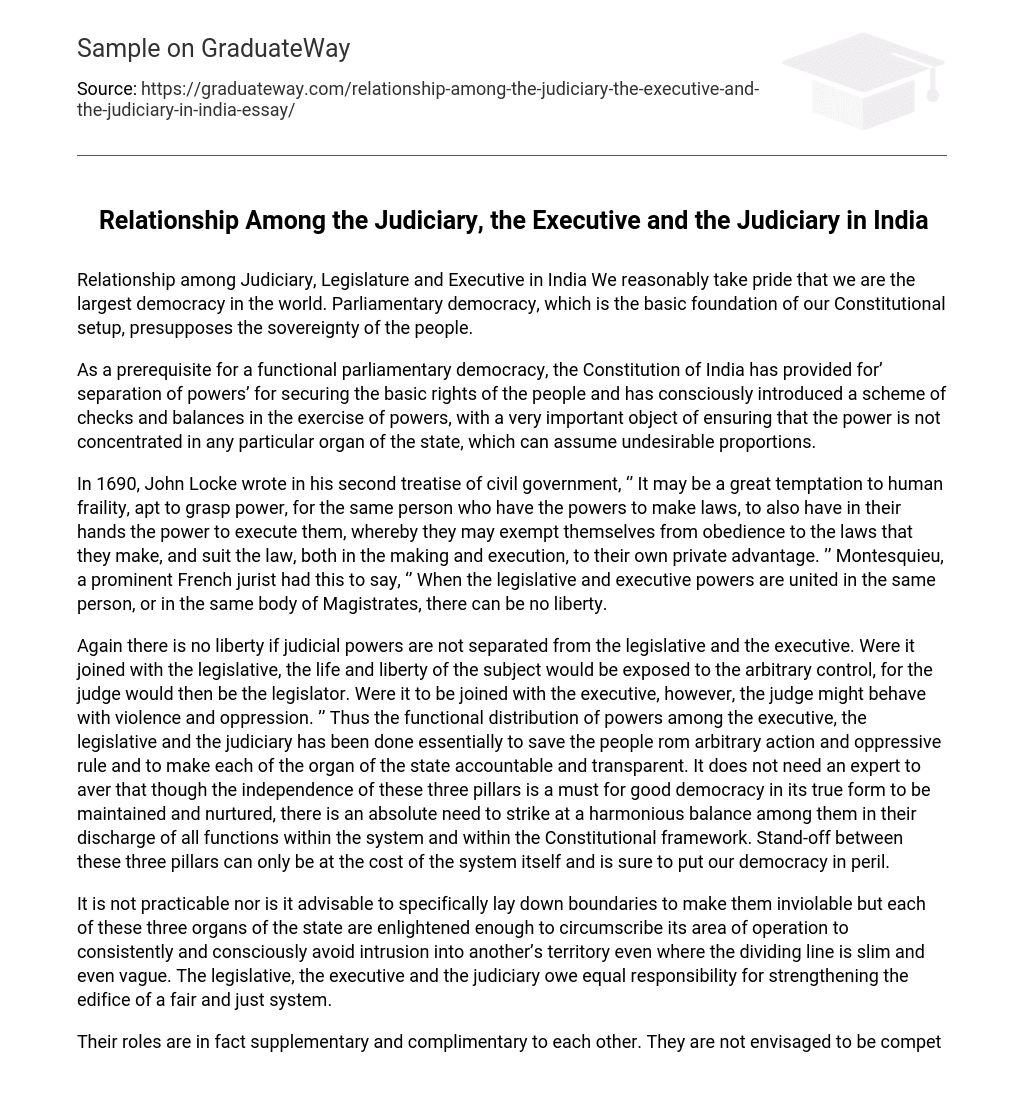Relationship among Judiciary, Legislature and Executive in India We reasonably take pride that we are the largest democracy in the world. Parliamentary democracy, which is the basic foundation of our Constitutional setup, presupposes the sovereignty of the people.
As a prerequisite for a functional parliamentary democracy, the Constitution of India has provided for’ separation of powers’ for securing the basic rights of the people and has consciously introduced a scheme of checks and balances in the exercise of powers, with a very important object of ensuring that the power is not concentrated in any particular organ of the state, which can assume undesirable proportions.
In 1690, John Locke wrote in his second treatise of civil government, ‘’ It may be a great temptation to human fraility, apt to grasp power, for the same person who have the powers to make laws, to also have in their hands the power to execute them, whereby they may exempt themselves from obedience to the laws that they make, and suit the law, both in the making and execution, to their own private advantage. ’’ Montesquieu, a prominent French jurist had this to say, ‘’ When the legislative and executive powers are united in the same person, or in the same body of Magistrates, there can be no liberty.
Again there is no liberty if judicial powers are not separated from the legislative and the executive. Were it joined with the legislative, the life and liberty of the subject would be exposed to the arbitrary control, for the judge would then be the legislator. Were it to be joined with the executive, however, the judge might behave with violence and oppression. ’’ Thus the functional distribution of powers among the executive, the legislative and the judiciary has been done essentially to save the people rom arbitrary action and oppressive rule and to make each of the organ of the state accountable and transparent. It does not need an expert to aver that though the independence of these three pillars is a must for good democracy in its true form to be maintained and nurtured, there is an absolute need to strike at a harmonious balance among them in their discharge of all functions within the system and within the Constitutional framework. Stand-off between these three pillars can only be at the cost of the system itself and is sure to put our democracy in peril.
It is not practicable nor is it advisable to specifically lay down boundaries to make them inviolable but each of these three organs of the state are enlightened enough to circumscribe its area of operation to consistently and consciously avoid intrusion into another’s territory even where the dividing line is slim and even vague. The legislative, the executive and the judiciary owe equal responsibility for strengthening the edifice of a fair and just system.
Their roles are in fact supplementary and complimentary to each other. They are not envisaged to be competing centres of power. Each organ of the state shows due respect for the specific role of the other in the governance of the country and ultimately towards the well being of the real masters- that is – we the people. I wish to add that as the custodians of the interest of the entire nation the three pillars of the state are expected to observe high standards of integrity, probity and rectitude.
They have to work as an integrating force protecting as well as disciplining the diverse interests of the society in mutual respect and civility. The ethical values that permeate the three organs of the state have a deep and lasting effect and impact on the character and credibility of different level of society. Last but not the least, adherence to rule of law depends on harmonising the legislative, the executive and the judiciary on which the arch of our great democracy rests.





